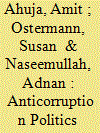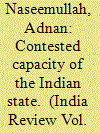| Srl | Item |
| 1 |
ID:
181397


|
|
|
|
|
| Summary/Abstract |
Eliminating corruption is seen as a practice that supports democratic governance. We argue, however, that particular anticorruption politics in contemporary India can damage the project of democratic deepening, because elites often deploy these politics against the representation of the marginalized. Anticorruption politics can subvert democratic deepening by challenging as corrupt the means by which the parties of the marginalized mobilize resources to compete in elections and by selectively targeting lower-caste political leaders for indictment on corruption charges within an overall discriminatory politics of deservedness. Anticorruption governance by parties in power seriously hinders the provision of welfare to the poor because of the technocratic and centralizing character of the governance reforms. We argue overall that while corruption is indeed damaging to democracy, elite anticorruption politics can also represent a significant barrier to democratic deepening and welfare.
|
|
|
|
|
|
|
|
|
|
|
|
|
|
|
|
| 2 |
ID:
149615


|
|
|
|
|
| Summary/Abstract |
State capacity is often seen as simply the resources and capabilities of state organizations to perform those functions that are seen as essential to monopolizing coercion, maintaining legitimacy, and providing key public and social goods. As such, it is often conceptualized as value-neutral and comparable across national contexts. By contrast, this article posits that in the Indian context, state capacity is a politically contested concept, because there is deep and enduring political conflict in India over the appropriate roles and related capabilities of state power. This conflict is grounded in disagreements between those who wish to use the state as a tool to transform society and those who see it as a means to preserve and protect social relations. As a result of this conflict, the state in India is not weak or captured but internally divided and thus disarticulated. This article demonstrates these dynamics through an examination of state intervention in the statist and post-liberalization political economy of India.
|
|
|
|
|
|
|
|
|
|
|
|
|
|
|
|